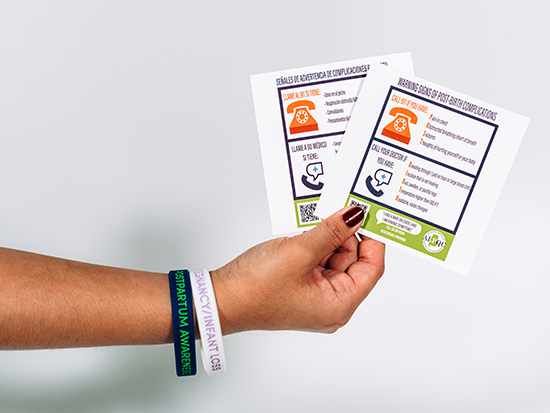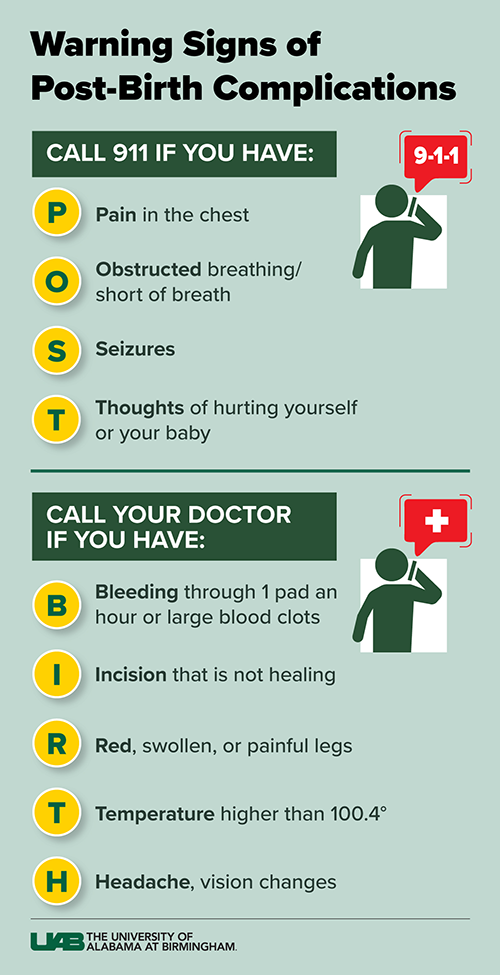 Patients at participating hospitals can receive either a “Postpartum Awareness/I Just Delivered” bracelet or a “Pregnancy/Infant Loss” bracelet.
Patients at participating hospitals can receive either a “Postpartum Awareness/I Just Delivered” bracelet or a “Pregnancy/Infant Loss” bracelet.
Photography: Andrea MabryHalf of pregnancy-related deaths in Alabama occur in the first six weeks postpartum. Studies show early recognition and treatment of post-birth complications can prevent many of these deaths.
The Alabama Perinatal Quality Collaborative, housed in the University of Alabama at Birmingham School of Public Health, launched a Postpartum Awareness Bracelet pilot program in June. The program aims to increase recognition and treatment of postpartum complications and decrease the obstetric-related readmission rate by 20 percent.
Patients at participating hospitals can receive either a “Postpartum Awareness/I Just Delivered” bracelet or a “Pregnancy/Infant Loss” bracelet. The bracelets will serve as medical alert bracelets to providers and emergency medical services.
“If a woman has a medical emergency and is unable to speak for themselves, the bracelets will help inform providers of their postpartum status,” said Lora Ham, obstetric quality improvement nurse and project lead. “Knowing this information is crucial for emergency medical providers to quickly identify potential issues and best course of treatment.”
In the first year postpartum, women have a higher risk of complications like hemorrhage, preeclampsia/eclampsia, infection, sepsis, cardiomyopathy, embolism or stroke, mental health disorders and substance use disorders. Many signs of these complications go unnoticed as women and families adjust to a new postpartum life.
“New moms often push their health to the side when they are adjusting to a new routine and taking care of a newborn,” Ham said. “We hope the bracelets will serve as a reminder to women to prioritize their own health as well because a healthy family and community begins with a healthy mom.”
Women who experience a pregnancy or infant loss will be given a special bracelet that acknowledges their loss. Wearing the bracelet will alert providers of their risks for mental and physical postpartum complications and remind them that they are not alone during the grieving process and support is available.
Learn more about the Alabama Perinatal Quality Collaborative and the Alabama Maternal Health Task Force.
The program also seeks to increase awareness of post-birth complication warning signs.
“Some postpartum complications can quickly become life-threatening if not properly treated in a timely manner,” said Frances Burgan, M.D., assistant professor in the UAB Department of Obstetrics and Gynecology and ALPQC obstetrics co-lead. “It is important for women who are postpartum, and their family, to recognize these signs so they are prepared to seek help.”
If someone in the postpartum period experiences any of the warning signs below, they should call their health care provider or 911 and inform them of their postpartum status. The acronym “POST BIRTH” is an easy way to remember these complications:
 If someone in the postpartum period experiences any of the warning signs, they should call their health care provider or 911 and inform them of their postpartum status.
If someone in the postpartum period experiences any of the warning signs, they should call their health care provider or 911 and inform them of their postpartum status.
Click to enlarge.
Graphic: Jody PotterPain in chest- Obstructed breathing/shortness of breath
- Seizures
- Thoughts of hurting oneself or one’s baby
- Bleeding through one pad an hour or large blood clots
- Incision that is not healing
- Red, swollen or painful legs
- Temperature higher than 100.4 degrees Fahrenheit
- Headache, vision changes
The ALPQC team hopes to use the program to garner feedback from moms across the state on how hospitals and organizations can better support them during the postpartum period. Information collected from the hospitals and participants will be used to establish baseline data regarding obstetric readmissions across the state, which will help drive future programs and studies.
The pilot program is funded through a grant from the Health Resources and Services Administration. Participating hospitals include:
- UAB Women & Infants Center
- Ascension St. Vincent’s
- Baptist Medical Center South
- Brookwood Baptist Health
- Huntsville Hospital for Women & Children
- Jackson Hospital
- Walker Baptist Medical Center
USA Health Children’s & Women’s Hospital started their bracelet program in 2023 and will contribute important feedback and data to the Postpartum Awareness Bracelet program.